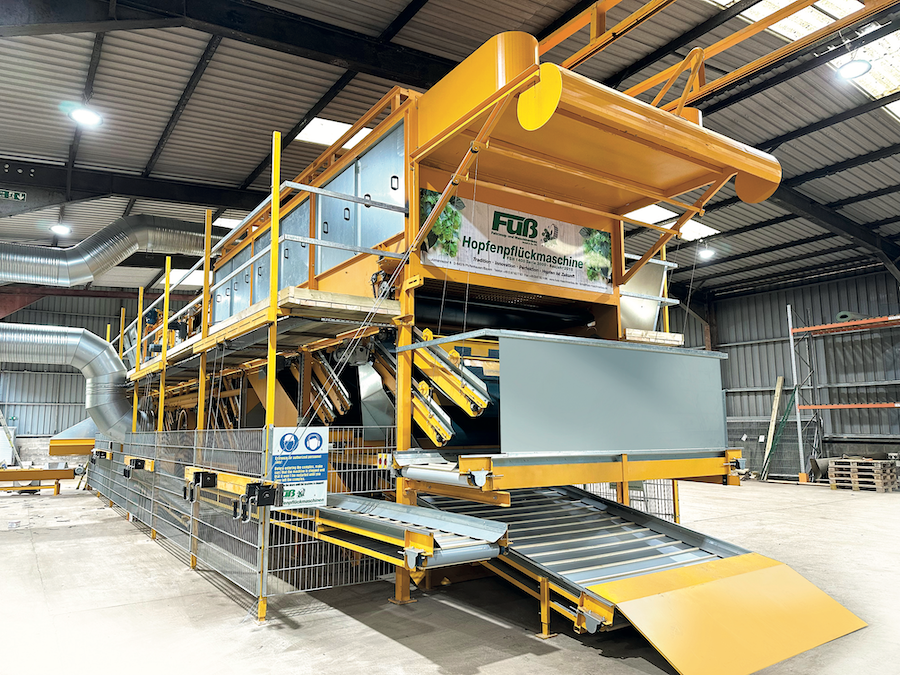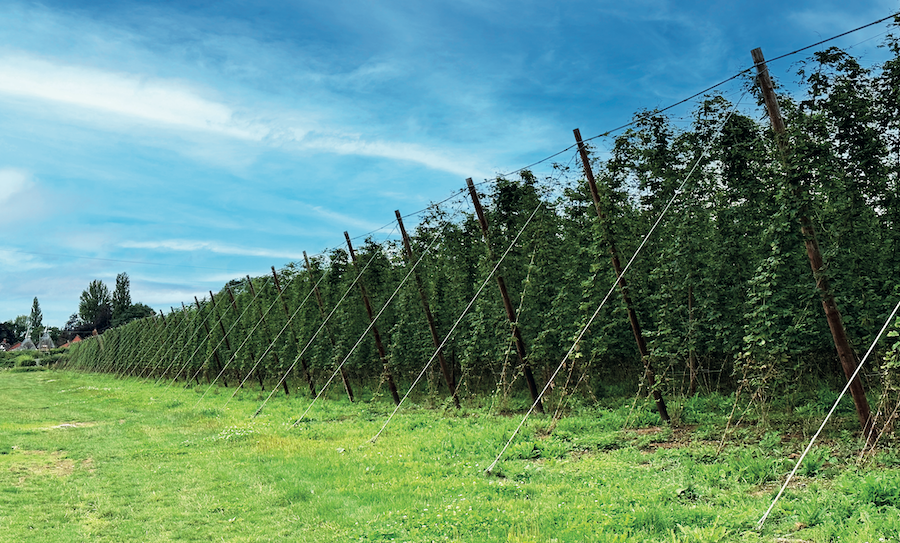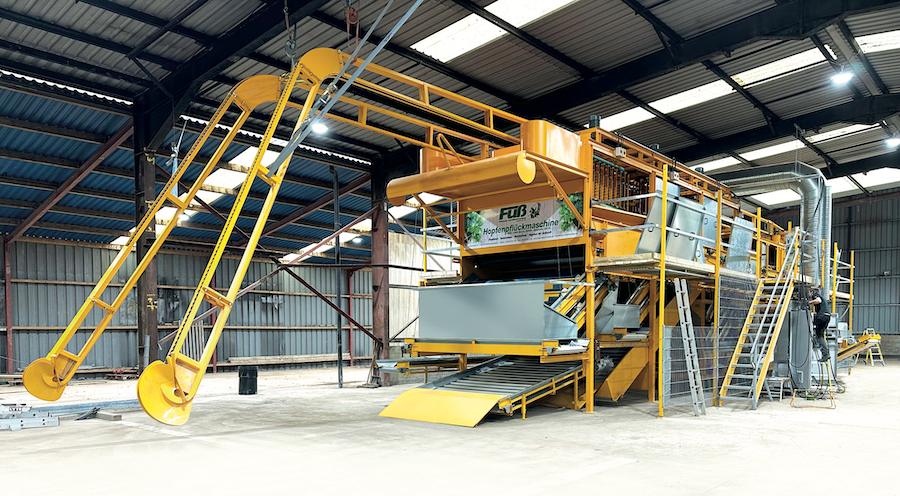Hop harvester purchase made possible by finance
13th March 2024
It’s one thing knowing you desperately need to replace your hop-picker. But it’s another to actually make such a major purchase – especially when your money is needed for so many other things. Grower Sarah Hawkin took that plunge.

Sarah Hawkin is owner of Herefordshire mixed farming enterprise, Hawkins Farming. Within her business she grows a range of arable crops, manages a herd of pedigree Herefordshire cattle, grows apples for cider production, and it is also home to a busy hop yard.
Hawkins Farming grows a range of hop varieties; some traditional – Goldings for example dates back to the 1790s – through to latest projects, Jester, Olicana and Harlequin, with their citrus flavours. As Sarah explains: “We have many trial plots on the farms, testing and developing new and exciting future varieties as part of the Charles Faram breeding programme.”
Hop flowers are known as cones, and their flavouring and preservative properties differ with each variety. They also differ according to where they are grown, much like grapes, so the French term ‘terroir’ is also highly relevant for hops.
According to Sarah, hops are a rewarding but very challenging crop to grow. “An old Kentish rhyme said of them: ‘First the flea, then the fly; then the mould, then they die.’
“They require a great deal of sympathetic management, and then, during a frenetic five-week period around September, they have to be harvested and processed as quickly as possible in what becomes a factory environment, whilst still giving them the delicate handling that they require. No other crop in British farming can be as interesting as this one!”
With an efficient harvest being of paramount importance, finding and financing a new hop-picker to replace the farm’s ageing machinery was a key challenge for Sarah last year.
“Our machines had been with us since the 1950s,” she says. “They’d obviously done really well, but in the end, they were two machines sort of cobbled together and they needed a lot of specialist expertise to run them. Fortunately, our engineer is a steam engine enthusiast, and this knowledge helped to take care of that side; but we were also finding it more difficult to get parts because they were manufactured using imperial measurements so we had to get them specially made.
“And, of course because of their age, they’d leave a stick or a leaf on the hops. It really was time to get rid of the old machines.”
Protecting cash flow
Despite knowing what needed to be done, Sarah faced the same dilemma that most farmers do – how could she invest in much-needed new equipment while also protecting her cash flow?
“Today’s brewers want the cleanest, best quality hops possible and we are competing to provide them against growers from America, Europe and New Zealand. Our hops have to be absolutely perfect to stand out. But new machines cost money – a lot of money.
“We did our maths and crunched lots of numbers to justify the purchase, and made a lot of trips to Germany to find exactly the right machine. But when we tried to get a grant from Defra, we were turned down; mainly I think because no-one knows exactly what a hop is, and no-one there understood what we were trying to do. It didn’t fit their criteria with it being robotic – they understood dairy and soft fruit, but not hops.”
But Sarah says she found the solution in Fruit & Vine when she read about Rural Asset Finance (RAF). Now, thanks to the finance specialist’s help, she’s the proud owner of a state-of-the-art hop-harvester Fuß FSH1400 – the German company’s first machine in the UK.
“I’d previously never heard of Rural Asset Finance,” she says. “I wanted the machine, but I’d got extra projects going on as well and I didn’t want to tie up all my working capital. One evening I happened to read about a grower they’d helped to buy equipment, but using a deal that didn’t touch their capital and maintained their cash flow. I thought, ‘Ooh, that’d suit me!’”
Sarah called the number, and within a few days was welcoming RAF’s sales director Ben Wood to the Ledbury farm to explain her vision.
“He was really friendly – but what came across even more was that he really understood how a farm works, why we needed this equipment, and the difference it would make to our business. He was really interested in the machine, how it worked and what it would give me. Just from the type of questions he asked, it was immediately obvious that he had a farming background with first-hand knowledge, and knew exactly what he was talking about.”

Conversely, Sarah’s answers made Ben immediately confident RAF could help. “I was really impressed with Sarah – she’s a true innovator in her field, really knows her business and it’s quite normal for us to supply funding for such high value bespoke agricultural equipment. It is really exciting to help her take things to the next level,” Ben comments.
Rural Asset Finance offered Sarah a bespoke finance package, based on an HP agreement, that was tailored specifically to her exact needs. “Hop harvesting season begins in September,” says Ben, “so I established from Sarah that December payments would suit the business cashflow. For such a diverse farm, it is paramount to retain working capital for new opportunities and investments moving forwards.”
The agreement was approved by RAF’s inhouse team within just 24 hours of the application being submitted, meaning the money was made available to Sarah within just a few days.
“Of course, it was sensible to speak to banks as well, but their terms weren’t as good, they didn’t seem to ‘get’ what I was doing, and they wanted me to jump through so many hoops. With Rural Asset Finance, it was so straightforward – I obviously had to give them accounts and other information, but it was just so quick and clear. And, unlike a bank, I had a direct telephone line – if I had any questions or queries, I’d be able to ring Ben and get straight through to him.”
Saving on labour
The machine itself has proved to be a very successful purchase. “It’s wonderful – it’s completely changed the way we work,” says Sarah. “It’s very compact with wide belts, which is a real plus.
“There are two arms where the hops get hooked on, which is so simple to do – in the old machine, we used to virtually have to tie a knot with every bind.
“The binds are then stripped totally and go through a series of cleaners so the hops are perfect, and then the waste bind goes through a chopper at the end. We used to be left with whole binds that took years to compost, but this breaks down in months so gives value to our waste product.”
It saves money on labour, too. “There’s no-one on the machine apart from two guys at the beginning putting hops in a slot and that’s it. We don’t need to find so much seasonal labour, and because we don’t need people on the machine while it’s running, many of the health and safety issues have gone, too.”

Making a difference
Within a few weeks, Sarah was proudly inviting Ben back to see the hop harvester in action – and he jumped at the chance. “It’s really exciting to see the difference we’ve made,” he says. “Meetings and follow-up visits are so important to build long-term working relationships with our clients. I look forward to many more visits to see how the farm is growing and assisting in any way I can to make any further funding projects as straightforward and stress-free for Sarah as possible.”
Sarah is already looking to the machine to help her expand the hop crop. “We have only just started,” she says. “We can put a lot more through it than we do. We grow 28ha at the moment, and this machine now gives us the capacity to go up to 40ha. We’re currently filling existing wirework that’s empty so it would be nice to put up a new yard. We currently transport the picked hops elsewhere so we might now also invest in a hop-drying facility so it’s all in the one place. We’ve got the room – this machine takes up half the space of the old one.
“We have a lot of ideas about what we could do next,” says Sarah. “We haven’t quite decided exactly what, but I would definitely finance this way again. Ben has been consistently supportive and has been in touch regularly, asking how we’re getting on – I think with his farming background, he’s as excited as we are by the difference the new harvester has made!
“It’s good to know that whatever we decide to do next, I can just pick up the phone to Ben and start the conversation.”
Read more machinery news
